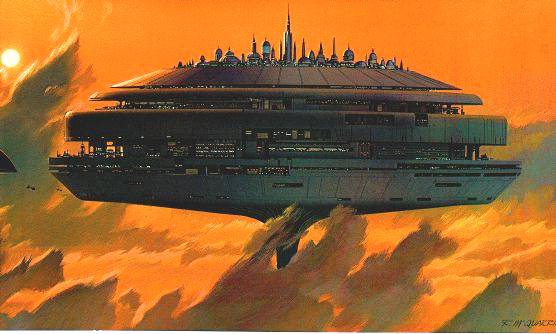A scientist at NASA conducted a mental exercise and found that on Venus the air pressure and gravity are similar to that of Earth, except that you have to climb to a height of 50 kilometers. Of course, a closed environment filled with air is required like on Earth, except that balls filled with such air will float

People in the space community have a tendency to push the boundaries of imagination as to the capabilities that await us in the universe. Gregory Landis, a scientist at NASA's Glenn Space Center writes science fiction in his spare time. Andys recently shared his vision for using solar-powered aircraft to explore Venus, and this time he's going one step further (several steps, actually) and proposing to inhabit nothing less than the planet Venus. Yes, Venus, our hot neighbor, which suffered from the greenhouse effect and the unbearable pressure on the surface, not only humans but also some spaceships that landed on the planet did not survive more than a few minutes. Landis does know that Venus is uninhabitable, but at an altitude of 50 kilometers above the surface, Venus's atmosphere resembles that of Earth. Landis proposes building floating cities on Venus where people can live and work as well as explore the planet below.
"There were already people who suggested establishing colonies in space, such as colonies that move in free space and are disconnected from a planet," says Landis. "If we think about the distant future, why don't we think about a breakthrough possibility, or maybe it's more correct to say breaking through the atmosphere.

At an altitude of 50 kilometers, Venus has an air pressure of about one atmosphere and a temperature range of zero to fifty degrees Celsius, a fairly comfortable environment for humans. We will not be required to wear pressure suits, but we will not be able to wear normal clothes, we will still have to breathe oxygen and protect ourselves from the sulfuric acid in the atmosphere.
As for Venus, what amazed Landis was that a body filled with a terrestrial atmosphere of nitrogen and oxygen would float in an atmosphere composed mostly of carbon dioxide. "Since the atmosphere of Venus is composed of carbon dioxide, the gases we need for life such as nitrogen and oxygen will be light gases." On Earth we know that for something to float it has to be lighter than air. On Venus you need something lighter - our air is lighter than Venus's atmosphere.
So the best thing is to build a bubble, fill it with Earth's air and float it on Venus. The biggest problem will be to find materials that resist the sulfuric acid for the construction of the outer layer of the bubble, ceramics or metal sufflates can do the job, but of course, we won't be able to look outside, "think what a beautiful view there is" said Landis.
In response to Universe Today's question if he would recommend the planet Venus, Landis said: "Of course, that's one of the reasons why I started thinking about floating cities. Landing a Venus-type planet would be a difficult project, so I looked for alternatives."
In 1962, Carl Sagan first talked about the concept of terraforming Venus, but it was not yet known how difficult it would be. "They didn't know then how hard Venus is, they had no idea about the composition of Venus' atmosphere and how hot it is there. They didn't know the density of the atmosphere." Landis said. "They knew that there was a greenhouse effect on Venus, but they didn't know how bad it was, but the more we work on the problem, the more certain we are that it is a serious problem. However, Landis believes that Venus has a good environment for humans. "On Venus there is a problem if you define sea level as a place in the atmosphere that is at sea level. On Venus, the sea level is simply high above the ground.
While Landis' plans for flying An aircraft powered by the solar wind that will separate from the spacecraft that will bring it and tour the atmosphere of Venus are being considered as a serious possibility. His proposal to inhabit this planet is much more speculative. "This is a thought exercise," said Landis. "An exercise in imagination more than something we will see in the near future. I don't expect humans to build cities on Venus, at least not in this century."

12 תגובות
Settlement of Nega by floating cities...
As in Cowboy Bebop!
(just not banga)
Response to Qantas in possession..
You claim problems in understanding the article, etc... against the commenters.
Well, look, your response really, really, really doesn't make sense to me, it's trying to be clever and I'm convinced that any material that was written would have been negatively criticized by
If you want to show your wisdom a lot (and I am convinced that it does exist)
He demonstrated it in the corridors of the Technion
Qantas in possession
Are you inviting to ummmmmmmmmmmmmmm??????
Hoping that something interesting will be born
Everyone will be excited.
Is that true??????
So be more optimistic and happy.
For the purposes of the harmonic connections..and in the octave..much more intelligent and logical
Peripheral.. I would be very happy if my fellow intellectuals really participated
In the discussions going on here... and giving their part...
It seems to me that we are given an opportunity....Pez..to start to bridge all the contexts and illusions
From the vast body of knowledge that humanity today is in...
There is absolutely no lack of knowledge..the necessary..as a whole.
The articles here are fascinating and stimulating... and the responses.. everyone.. living people.. for the spirit
Eternal.. found in the veins and arteries of all of us.. there and here and everywhere..
Challenging question.. What is the connection between an atom.. and the solar system..
How is this article related to the mythological birth of Venus, foam, electricity, and Uranus.
Who influences, who is influenced, how the connections work in the fabric of consciousness.
In short, all the opposites, the contrasts... are invited to the rabbi discourse.. the virtual..
Blessed is the match that lit..the fuse...to our friend……………..in ciphers.
Blessed are Tamimi....the heart...the responders..
Well.. well... and there are no shortage of other sites.
Adios………………Ssssssssssssssssssssssssssssssssssssssssssssssssssssssssssssssssssssssssssssssssssss
Finally, the logical initial solution would be to reduce man.
Creating reduced living conditions to ensure humanity within a small space.
Or even storing receipts in communication cabinets.
The road has already begun and the direction is clear
Society:
Just please remember that even Landis (who described this as more of a thought experiment than a practical plan) was only talking about a solution for research teams and not a way to settle ordinary residents on Venus.
Yossi Cohen:
Receiving an answer in the article where you wrote this comment for the first time (which, unlike the current article, was relevant. There is no reason to repeat a response to article A in article B when the readers of article B do not know what you are talking about at all)
It's interesting that this mental exercise reminds me of "Lapote" from Gulliver's Travels...
It seems to me that both here and in Gulliver, the meaning of the idea is the same and so is its execution.
Hanan Sabat
http://WWW.EURA.ORG.IL
In my opinion, unfortunately, apart from a number of space stations where mainly researchers will live, there will be no significant settlement of humans on my planets. This is due to several reasons:-
A. The enormous cost of sending people and supplies into space.
B. The enormous cost of renovating a planet to Earth-like living conditions.
third. The short-term solution it will allow for the reproduction of the earth's inhabitants doubling the population every few decades, so that very quickly we will be back to the starting point.
d. The cheaper alternatives found on the planet are:-
Building to height, digging to depth, drying up the sea, living on floating surfaces, and even, living inside the oceans in closed spaces, or spaces like the above that float in the atmosphere, surely there are other ideas.
Each of the above options is at least hundreds of times cheaper and more efficient than colonizing the two planets.
God. Very quickly the inhabitants of my planets will become people with their own desires that will not always conform to the desires of those who send them. For example:- the USA that seceded from England, Australia that seceded from England and demanded to stop sending criminals to it, etc. So the first settlers on any planet will not want to continue accepting immigrants and would prefer to keep the planet's sources for themselves. Really similar to the residents of Europe who do not want to accept immigrants.
Other than that, have a good day
Sabdarmish Yehuda
A space station that manages to support 4 people took years to build and maintain and slowly continues to build
And the honorable gentleman wants to build it in Venus, I'm sure at any stage
In the future this can be done, but all of this will not be possible until they find cheap and available strong energy that will allow flights to further space
In my (poor) opinion, the return to space will happen faster than expected.
Very simply, apparently, in the year 2100 there will be 12 billion people living on earth. In addition, the amount of waste produced by each person is increasing sharply. There will be no choice but to start colonizing space or at least start mining resources and dumping waste in space on an industrial scale.
If they work there, they live there.
Oh, and regarding Newsoy, the speed of light offense, I thought that it was impossible to discover something faster than what you are capable of, so if the detectors discovered a speed greater than the speed of light, that means that the reaction speed in them and the electricity are faster than light, and besides, what if the light is limited, even if it is, surely there is a way to pass it with a different energy
Hello, I don't come to provoke anger.. and sorry in advance,
I'm only really interested.
I would like to share the information I have
Please visit this channel
http://www.youtube.com/AVIMOAS
And go straight back to Idan.
Because here is the most interesting